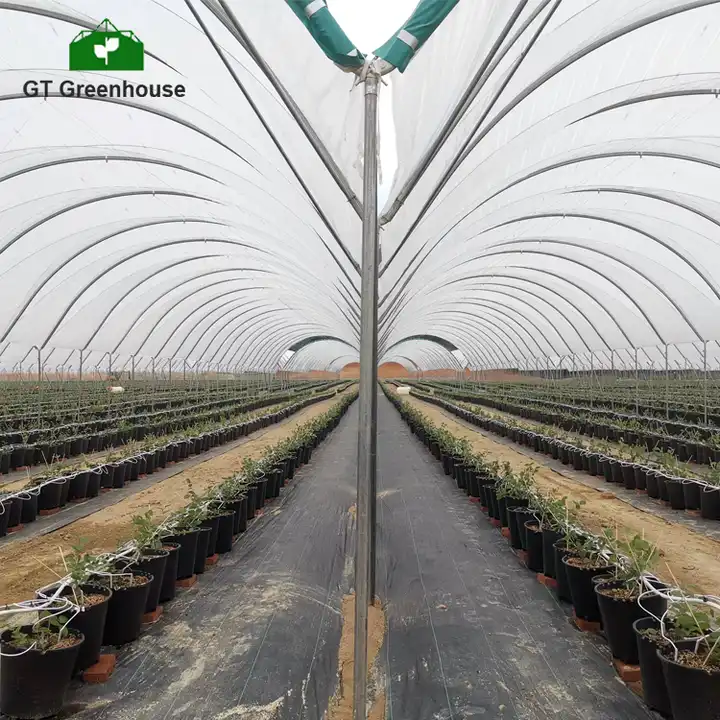When choosing a polytunnel greenhouse manufacturer, there are several factors to consider to ensure you make the right choice.
Here are some key aspects to pay attention to:
- Reputation and Experience: Look for a manufacturer with a solid reputation and extensive experience in producing polytunnel greenhouses. Research their background, read customer reviews, and check if they have a history of delivering high-quality products.
- Quality of Materials: Assess the quality of materials used by the manufacturer. A polytunnel greenhouse should be made from durable materials that can withstand weather conditions and provide adequate protection for your plants. Inquire about the type of frame, covering materials, and connectors used in their products.
- Customization Options: Determine if the manufacturer offers customization options to meet your specific needs. Every greenhouse project is unique, and you may require specific dimensions, features, or additional accessories. Ensure the manufacturer can accommodate your requirements.
- Design and Engineering: Evaluate the design and engineering capabilities of the manufacturer. A well-designed polytunnel greenhouse should provide optimal ventilation, structural integrity, and efficient use of space. Inquire about their design process and if they use computer-aided design (CAD) software to ensure accuracy.
- Warranty and Support: Check if the manufacturer provides a warranty for their products. A reliable manufacturer will stand behind their greenhouse and offer support in case of any issues or defects. Understand the warranty terms and inquire about after-sales support, replacement parts availability, and customer service.
- Price and Value: Consider the pricing of the manufacturer’s products and compare it with similar offerings in the market. While cost is a factor, prioritize value for money rather than solely focusing on the lowest price. Evaluate the overall quality, features, and durability of the greenhouse to ensure it meets your requirements.
- Installation and Maintenance: Inquire about the installation process and if the manufacturer provides detailed instructions or professional installation services. Additionally, consider the maintenance requirements of the polytunnel greenhouse and whether the manufacturer provides guidance or resources for upkeep.
- Certifications and Compliance: Check if the manufacturer adheres to industry standards and has relevant certifications for their products. This ensures that the greenhouse meets safety regulations and quality standards. Look for certifications like ISO 9001, CE marking, or any specific regional certifications.
- Customer References: Ask the manufacturer for references from previous customers who have purchased their polytunnel greenhouses. Reach out to these customers and inquire about their experience with the manufacturer, the quality of the product, and their overall satisfaction.
By considering these factors, you can make an informed decision when selecting a polytunnel greenhouse manufacturer that best suits your requirements and ensures a reliable and durable product.
Unveiling the Versatility and Benefits of Polytunnel Greenhouses
Polytunnel greenhouses have emerged as indispensable tools for modern agriculture, transforming the way crops are cultivated and nurtured. These structures, known for their adaptability, durability, and cost-effectiveness, offer a multitude of advantages for growers across various settings.
What are Polytunnel Greenhouses?
Polytunnel greenhouses, also referred to as hoop houses or high tunnels, are semi-circular or curved structures made of arched metal or PVC pipes covered with polyethylene plastic. These structures create a protected environment that shields plants from adverse weather conditions while allowing sunlight to penetrate for photosynthesis.
Features and Benefits:
1. Controlled Environment:
- Temperature Regulation: Polytunnel greenhouses provide a controlled microclimate, extending growing seasons and protecting plants from frost, wind, and excessive heat.
- Humidity Control: They help maintain optimal humidity levels, preventing moisture-related diseases and promoting healthy plant growth.
2. Versatility and Adaptability:
- Crop Diversity: These structures accommodate various crops, from vegetables and fruits to flowers and herbs, enabling growers to diversify their cultivation.
- Customization: Available in various sizes, lengths, and configurations, polytunnel greenhouses can be tailored to fit specific space requirements and growing needs.
3. Cost-Effectiveness and Accessibility:
- Affordable Solutions: Compared to traditional glass or rigid-frame structures, polytunnel greenhouses offer cost-effective options for small-scale growers and commercial farmers.
- Easy Assembly: They are relatively easy to set up and relocate, providing flexibility for seasonal crops or changing cultivation needs.
4. Enhanced Crop Protection and Yield:
- Pest and Disease Control: These structures act as a barrier against pests, insects, and some diseases, reducing the need for chemical interventions.
- Improved Yields: By providing an ideal growing environment, polytunnel greenhouses often result in higher-quality crops and increased yields compared to open-field cultivation.
5. Sustainability and Environmental Benefits:
- Resource Efficiency: Polytunnel greenhouses require less water and fertilizers due to reduced evaporation and optimal conditions, contributing to resource conservation.
- Eco-Friendly Practices: Many modern polytunnel structures incorporate recyclable materials and support eco-friendly farming practices.
Applications:
- Commercial Agriculture: Poly tunnels are extensively used in commercial agriculture for large-scale crop production, enabling year-round cultivation and increasing overall productivity.
- Small-Scale Farming: They also benefit small-scale farmers and gardeners, providing a cost-effective solution for growing fresh produce.
- Research and Educational Purposes: Educational institutions and research centers utilize polytunnel greenhouses for studying plant growth, experimenting with new varieties, and teaching agricultural techniques.
Polytunnel greenhouses stand as versatile, cost-effective, and adaptable structures that play a pivotal role in modern agriculture. Their ability to create a controlled environment conducive to plant growth, coupled with their accessibility and sustainability, positions them as essential tools for growers seeking efficiency, productivity, and crop quality.
